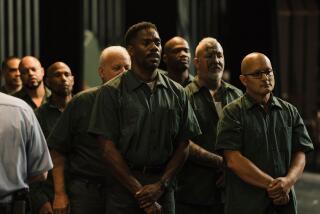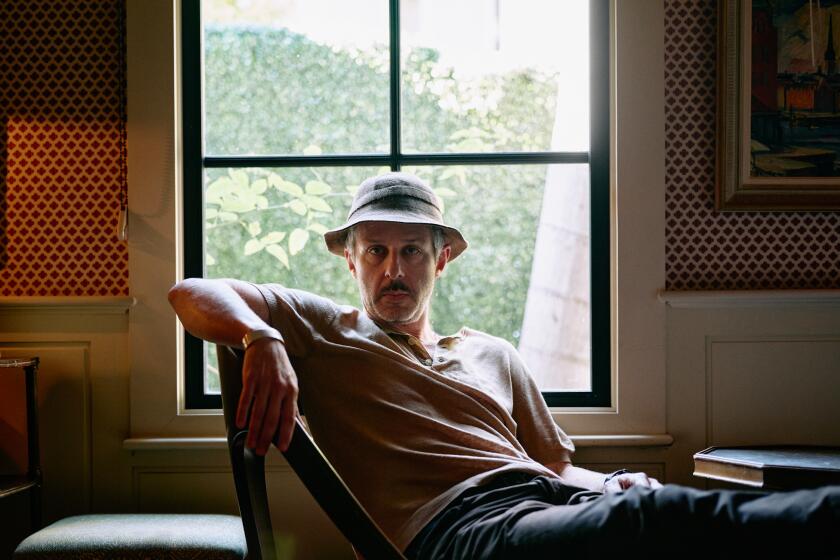MOVIE REVIEW : ‘Mac’ Passionately Celebrates Work Ethic : John Turturro makes his directing debut and stars in an affectionate paean to his father that’s also an exorcism from him.
“Mac” (at the Nuart) gives us a pretty good idea of where John Turturro’s manic intensity comes from. Whether playing the nebbishy, idealistic New York playwright turned loose in Golden Era Hollywood in “Barton Fink” or the petty crook pleading for his life in “Miller’s Crossing” or in his various roles in Spike Lee films, Turturro is the archetypal blue-collar ethnic guy, unhandsome and put upon, who at the end of his tether gets a wild, frozen look in his eyes just before exploding.
This happens a lot in “Mac,” at once a labor of love 12 years in gestation and an exorcism, for in his directorial debut Turturro is playing a man based on his own father, a bombastic, hard-driving first-generation Italian-American carpenter. It couldn’t have been easy growing up the son of the late Nicholas R. Turturro, but “Mac” is suffused with a clear-eyed love and respect. It is also that rarity, a movie about work.
“You know what I think happiness is?” asks Mac Vitelli (Turturro). “To love your job. Not many people know this--that’s why they take vacations--but it’s the truth. If you hate your work, you hate your life. I like my work.”
It’s Queens, 1954, and Mac and his two brothers, the sweet, paunchy Vico (Michael Badalucco) and the reflective art student Bruno (Carl Capotorto) have just buried their father. They’re all working in construction for Polowski (Olek Krupa), a cynical, corner-cutting contractor who enjoys making his men miserable. Inevitably, the day comes when Mac has had his fill and persuades his brothers to take the big gamble of going into business for themselves.
There is a great deal of broad humor as well as warm sentiment in the briskly paced “Mac,” which Turturro first developed as a play with his co-writer Brandon Cole. There is also much concern for detail and nuance, as in the way he introduces the three brothers. Each is given a distinct identity through the flashback memories triggered as they pause at their father’s casket.
Every frame of “Mac” bespeaks great care, with Turturro exploring the creative possibilities of sound and image to convey precisely what he feels. (Turturro is indebted to his resourceful cameraman Ron Fortunato and especially to composers Richard Termini and Vin Tese for their insistent yet richly varied score.) Such care allows “Mac” to move unobtrusively from humor to a tone of increasing seriousness as Mac’s dogged, single-minded devotion to make his particular American dream come true increasingly alienates his brothers.
For Mac there is no conflict between love of work and of family, and it is one of Turturro’s signal accomplishments that he shows us that the tough perfectionist who can inspire a fierce loyalty from his men (well-played by John Amos and Steven Randazzo, among others) can also instill massive resentment in his brothers, who are, after all, his partners. Mac is such an admirable man, so determinedly honorable in all his dealings yet so oblivious to his bullying impact upon his own flesh and blood. It never occurs to him that they may have dreams of their own, that they may not love carpentry as much as he does or that they could take his outbursts personally. What Turturro is telling us is that there can be a price exacted upon those constantly immersed in work.
The men in this film are seen in the round, and Vico and Bruno are as three-dimensional as Mac. Wistful, kindly Vico sees himself as a Lothario despite his awkwardness with women. Bruno, the quietest of the three, may well be the most talented and brightest of his brothers.
Although played by fine actresses, the women in the film do not fare as well. Turturro has cast his own real-life wife, Katherine Borowitz, as Mac’s wife. Borowitz’s Alice is strong, plain-spoken, and Borowitz is so skilled she’s able to let us see Mac through her loving, respectful eyes. But we want to know more about what makes her devoted ‘50s wife tick.
Ellen Barkin is always a vivid presence, but the picture would have been better without her brief appearances. Turturro so severely caricatures her poetry-spouting beatnik, who becomes more or less involved with Mac’s brothers, that instead of setting off the nobility of Mac’s work ethic she makes it seem needlessly smug and sanctimonious.
“Mac” (rated R for strong language and for some sexuality) probably could well have sacrificed a couple of Mac’s arias of rage in return for more time spent on its women, but it’s easily sustained by the sheer eloquence of its passion. You don’t often come by a film extolling the very real rewards of giving an honest day’s work for your wages.
‘Mac’ John Turturro: Mac Vitelli Michael Badalucco: Vico Vitelli Carl Capotorto: Bruno Vitelli Katherine Borowitz: Alice Vitelli
A Samuel Goldwyn presentation. Director John Turturro. Producer Nancy Tenenbaum, Brenda Goodman. Screenplay by Turturro, Brandon Cole. Cinematographer Ron Fortunato. Editor Michael Berenbaum. Costumes Donna Zakowska. Music Richard Termini, Vin Tese. Production design Robin Standefer. Art director John Magoun. Set decorator Amelia Battaglio. Sound Billy Sarokin. Running time: 1 hour, 58 minutes.
MPPA-rated R (for strong language and for some sexuality).
More to Read
Only good movies
Get the Indie Focus newsletter, Mark Olsen's weekly guide to the world of cinema.
You may occasionally receive promotional content from the Los Angeles Times.










